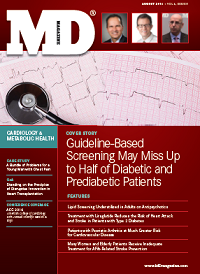Lipid Screening Is Underutilized in Adults Treated with Antipsychotics
Research suggests that lipid screening appears to remain particularly underutilized in adults taking antipsychotic medications, despite improvements in recent years in the use of diabetes screening in this patient population.

Study results from the University of Colorado Anschutz Medical Campus suggest that lipid screening appears to remain particularly underutilized in adults taking antipsychotic medications, despite improvements in recent years in the use of diabetes screening in this patient population.
With previous studies showing that adults with serious mental illness die 20 to 30 years earlier than their healthy counterparts—largely because of increased risk for diabetes, high cholesterol, high blood pressure, and heart disease—and antipsychotics shown to increase this risk even more, the American Diabetes Association and American Psychiatric Association have recommended intensive diabetes and lipid screening for patients who are on antipsychotics. The current study was conducted to determine if screening rates remained low, as determined in prior research.
“Antipsychotic medications are associated with substantial weight gain, as well as changes in insulin sensitivity and lipid metabolism, which increase the risk of diabetes and cardiovascular disease,” said lead author Elaine Morrato, DrPH, MPH, CPH, Associate Dean and Associate Professor in the Department of Health Systems, Management & Policy for the Colorado School of Public Health, at the University of Colorado Anschutz Medical Campus.
Morrato and colleagues did find that progress had been made in diabetes screening among the study population, when compared with prior reports. Their study, published in JAMA Psychiatry, included 9,316 adults aged 18 to 64 years who were starting antipsychotic medication. Secondary analysis included the subset of patients for whom prescriber knowledge, attitudes, and behavior survey data were available. Generalized estimating equations were performed to identify factors associated with failure to receive annual testing during antipsychotic treatment.
Data analysis was performed from October 1, 2014 to February 18, 2016 in order to identify medical claims for glucose or lipid testing occurring within 180 days before and after a claim for an oral second-generation antipsychotic.
When assessing what physicians were prescribing antispychotics for patients in the study, the study team found that about 75% of patients initiated therapy with a prescriber not practicing in a community mental health center (CMHC), despite federal and state investments to prevent and reduce cardiovascular disease among those with mental illness having focused on psychiatrists practicing in community mental health settings. Among participants, 24.3% initiated antipsychotic medication in a CMHC, 27.6% in a non-CMHD behavioral health facility, 24.3% with primary care practitioners, and 23.8% in other or unknown settings.
Overall, annual testing rates were 79.6% for glucose and 41.2% for lipids. Failure to test for either was most strongly associated with patient factors and healthcare utilization. Lower failure to receive testing was associated with older age (age 40 to 49 years vs age 18 to 29), diagnosis of schizophrenia or bipolar disorder, cardiometabolic comorbidity, hypertension, and greater outpatient utilization.
Whereas lower failure to receive glucose testing was found in patients who received care at CMHCs—or when the initiating prescriber was a primary care practitioner—upon analysis incorporating prescriber practice information, the initiating prescriber specialty/setting was not associated with lipid testing.
It is speculated that the low rates of lipid testing could be the result of conflicting messages on whether younger adults should be tested. Lipid-screening tests are recommended for all patients receiving antipsychotics regardless of mental health diagnosis in some guidelines, others recommend screening only in adults with schizophrenia or bipolar disorder, while still others recommend screening based on age, ethnicity, and other risk factors.
Morrato and colleagues call for Medicaid performance improvement initiatives to target all prescriber settings and not just behavioral health.
